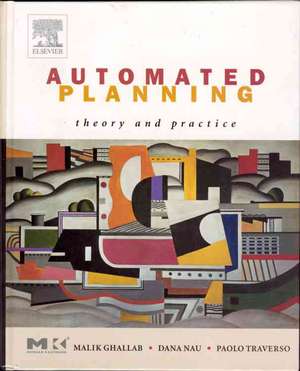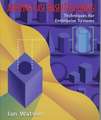Automated Planning: Theory and Practice: The Morgan Kaufmann Series in Artificial Intelligence
Autor Malik Ghallab, Dana Nau, Paolo Traversoen Limba Engleză Hardback – 21 mai 2004
Automated Planning mirrors this dialogue by offering a comprehensive, up-to-date resource on both the theory and practice of automated planning. The book goes well beyond classical planning, to include temporal planning, resource scheduling, planning under uncertainty, and modern techniques for plan generation, such as task decomposition, propositional satisfiability, constraint satisfaction, and model checking.
The authors combine over 30 years experience in planning research and development to offer an invaluable text to researchers, professionals, and graduate students.
- Provides a thorough understanding of AI planning theory and practice, and how they relate to each other
- Covers all the contemporary topics of planning, as well as important practical applications of planning, such as model checking and game playing
- Presents case studies and applications in planning engineering, space, robotics, CAD/CAM, process control, emergency operations, and games
- Provides lecture notes, examples of programming assignments, pointers to downloadable planning systems and related information online
Preț: 393.96 lei
Preț vechi: 631.48 lei
-38% Nou
Puncte Express: 591
Preț estimativ în valută:
75.39€ • 81.87$ • 63.33£
75.39€ • 81.87$ • 63.33£
Carte tipărită la comandă
Livrare economică 15-29 aprilie
Preluare comenzi: 021 569.72.76
Specificații
ISBN-13: 9781558608566
ISBN-10: 1558608567
Pagini: 672
Ilustrații: Illustrations
Dimensiuni: 191 x 235 x 43 mm
Greutate: 1.53 kg
Editura: ELSEVIER SCIENCE
Seria The Morgan Kaufmann Series in Artificial Intelligence
ISBN-10: 1558608567
Pagini: 672
Ilustrații: Illustrations
Dimensiuni: 191 x 235 x 43 mm
Greutate: 1.53 kg
Editura: ELSEVIER SCIENCE
Seria The Morgan Kaufmann Series in Artificial Intelligence
Public țintă
Primary audience: Senior undergraduate and graduate students in AI, Robotics, and Operations Research (in CS, EE and CompEng departments, mainly)Secondary audience: Researchers and practitioners in artificial intelligence, robotics, and operations research
Cuprins
1 Introduction and Overview
I Classical Planning 2 Representations for Classical Planning3 Complexity of Classical Planning4 State-Space Planning5 Plan-Space Planning II Neoclassical Planning 6 Planning-Graph Techniques7 Propositional Satisfiability Techniques8 Constraint Satisfaction Techniques
III Heuristics and Control Strategies 9 Heuristics in Planning10 Control Rules in Planning11 Hierarchical Task Network Planning12 Control Strategies in Deductive Planning IV Planning with Time and Resources 13 Time for Planning14 Temporal Planning15 Planning and Resource Scheduling
V Planning under Uncertainty 16 Planning based on Markov Decision Processes17 Planning based on Model Checking18 Uncertainty with Neo-Classical Techniques
VI Case Studies and Applications 19 Space Applications20 Planning in Robotics21 Planning for Manufacturability Analysis22 Emergency Evacuation Planning 23 Planning in the Game of Bridge
VII Conclusion 24 Conclusion and Other Topics
VIII Appendices A Search Procedures and Computational ComplexityB First Order LogicC Model Checking
I Classical Planning 2 Representations for Classical Planning3 Complexity of Classical Planning4 State-Space Planning5 Plan-Space Planning II Neoclassical Planning 6 Planning-Graph Techniques7 Propositional Satisfiability Techniques8 Constraint Satisfaction Techniques
III Heuristics and Control Strategies 9 Heuristics in Planning10 Control Rules in Planning11 Hierarchical Task Network Planning12 Control Strategies in Deductive Planning IV Planning with Time and Resources 13 Time for Planning14 Temporal Planning15 Planning and Resource Scheduling
V Planning under Uncertainty 16 Planning based on Markov Decision Processes17 Planning based on Model Checking18 Uncertainty with Neo-Classical Techniques
VI Case Studies and Applications 19 Space Applications20 Planning in Robotics21 Planning for Manufacturability Analysis22 Emergency Evacuation Planning 23 Planning in the Game of Bridge
VII Conclusion 24 Conclusion and Other Topics
VIII Appendices A Search Procedures and Computational ComplexityB First Order LogicC Model Checking
Recenzii
"Automated Planning is a tremendous book! It provides an extremely comprehensive, systematic, and clear coverage of this important and exciting field of AI. Readers will not only gain a deep understanding of the theoretical foundations of planning; they will actually learn how this future-oriented technology is to be applied in a variety of areas. Automated Planning is just the standard AI planning textbook we have been waiting for." --Professor Susanne Biundo, Director of PLANET, the European Network of Excellence in AI Planning
"This book is an excellent resource for both students and teachers, and a valuable reference guide for seasoned planning researchers. It covers a surprising level of technical details for its size, yet is quite accessible to t the mathematically astute reader. I would like to thank the authors for making this body of knowledge accessible to a wider audience." --Kutluhan Erol, Mindlore, Inc.
Planning research, which has been a key area in AI since the General Problem Solver of Newell and Simon in 50's, has undergone significant progress in the last few years. In this book, Malik Ghallab, Dana Nau, and Paolo Traverso, three leading AI planning researchers, provide the first balanced and comprehensive introduction to this exciting and fast moving field. --Hector Geffner, Universitat Pompeu Fabra
"AI planning experts, teachers, and students have been waiting for ages for the first textbook about the field---the comprehensive, up-to-date synthesis. Here it is! An admirable piece of work that will undoubtedly become a standard reference." --Joachim Hertzberg, Fraunhofer Institute for Autonomous Intelligent Systems
"A much needed and timely compendium that conveys both the diverse history and the current excitement of the research in Automated Planning." --Subbarao Kambhampati, Arizona State University
"The publication of this book creates an opportunity for planning to reach a much wider community than specialized researchers, to capture the imaginations of a new generation of AI students, both graduates and undergraduates, showing that while planning is rooted in strong theoretical foundations, its applications can reach from intelligent game play to evacuation operations and even to the stars! I am certain that it will find a place on the bookshelves of every serious planning researcher, but its true place is in the minds of our undergraduate and graduate students whom it should inspire to add to the impressive body of work it describes." --Derek Long, University of Strathclyde
"In recent years, comprehensive texts have been written for several of the other major areas of Artificial Intelligence, including machine learning, natural-language processing, and constraint-satisfaction processing, but until now, the field of planning has been devoid of such a resource, despite the considerable number of advances in and the significant maturation of planning research in the past decade. With Automated Planning: Theory and Practice, Malik Ghallab, Dana Nau, and Paolo Traverso have filled that void, and have done so with a remarkably clear and well-written book." --Martha Pollack, University of Michigan
"The authors cover a vast range of topics in planning research. The reader will find methodical formalisms of theoretical concepts with illustrative examples, as well as practical case studies. Well-developed exercises provide practice for students of planning. This is a great book." --Stephen Smith, Great Game Products
"This book is an excellent resource for both students and teachers, and a valuable reference guide for seasoned planning researchers. It covers a surprising level of technical details for its size, yet is quite accessible to t the mathematically astute reader. I would like to thank the authors for making this body of knowledge accessible to a wider audience." --Kutluhan Erol, Mindlore, Inc.
Planning research, which has been a key area in AI since the General Problem Solver of Newell and Simon in 50's, has undergone significant progress in the last few years. In this book, Malik Ghallab, Dana Nau, and Paolo Traverso, three leading AI planning researchers, provide the first balanced and comprehensive introduction to this exciting and fast moving field. --Hector Geffner, Universitat Pompeu Fabra
"AI planning experts, teachers, and students have been waiting for ages for the first textbook about the field---the comprehensive, up-to-date synthesis. Here it is! An admirable piece of work that will undoubtedly become a standard reference." --Joachim Hertzberg, Fraunhofer Institute for Autonomous Intelligent Systems
"A much needed and timely compendium that conveys both the diverse history and the current excitement of the research in Automated Planning." --Subbarao Kambhampati, Arizona State University
"The publication of this book creates an opportunity for planning to reach a much wider community than specialized researchers, to capture the imaginations of a new generation of AI students, both graduates and undergraduates, showing that while planning is rooted in strong theoretical foundations, its applications can reach from intelligent game play to evacuation operations and even to the stars! I am certain that it will find a place on the bookshelves of every serious planning researcher, but its true place is in the minds of our undergraduate and graduate students whom it should inspire to add to the impressive body of work it describes." --Derek Long, University of Strathclyde
"In recent years, comprehensive texts have been written for several of the other major areas of Artificial Intelligence, including machine learning, natural-language processing, and constraint-satisfaction processing, but until now, the field of planning has been devoid of such a resource, despite the considerable number of advances in and the significant maturation of planning research in the past decade. With Automated Planning: Theory and Practice, Malik Ghallab, Dana Nau, and Paolo Traverso have filled that void, and have done so with a remarkably clear and well-written book." --Martha Pollack, University of Michigan
"The authors cover a vast range of topics in planning research. The reader will find methodical formalisms of theoretical concepts with illustrative examples, as well as practical case studies. Well-developed exercises provide practice for students of planning. This is a great book." --Stephen Smith, Great Game Products





